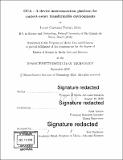OCA : a device interconnection platform for context-aware transformable environments
Author(s)
Pereira Silva, Lucas Cassiano
DownloadFull printable version (5.390Mb)
Alternative title
Device interconnection platform for context-aware transformable environments
Other Contributors
Program in Media Arts and Sciences (Massachusetts Institute of Technology)
Advisor
Kent Larson.
Terms of use
Metadata
Show full item recordAbstract
It is inevitable that personal architectural environments in the future will contain dozens, if not hundreds, of connected devices that will require human control. Currently, most interactions involve standalone devices, each with a unique and often non-intuitive interface, which places an unacceptable cognitive load on the occupants. To address this challenge, I propose to develop a framework that enables the devices to understand and react to the user's intentions towards the environment using pattern recognition coupled with a single user interface that is consistent across output modes. The system, designed to work within complex transformable environments, will allow the user to control furniture configuration, lighting, transparency, audio, fragrance, health systems, etc. Using machine learning, the system will correlate the user's preferences to those of others who have exhibited similar patterns of behavior in order to predict appropriate settings for novel situations. Overall, the system is expected to reduce the amount of time and cognitive load required to configure an environment for optimal comfort and utility. The proposed framework will be tested and validated in a small, re-configurable workplace environment designed to accommodate private work, phone calls, conversations, napping, and meditating. Occupants will be able to tune many parameters of the environment in response to context-aware transformations triggered by their ongoing activities. The proposed system will have an architecture based on a database infrastructure, sensor data collection, and algorithms for activity and pattern recognition.
Description
Thesis: S.M., Massachusetts Institute of Technology, School of Architecture and Planning, Program in Media Arts and Sciences, 2018. Cataloged from PDF version of thesis. Includes bibliographical references (pages 41-43).
Date issued
2018Department
Program in Media Arts and Sciences (Massachusetts Institute of Technology)Publisher
Massachusetts Institute of Technology
Keywords
Program in Media Arts and Sciences ()